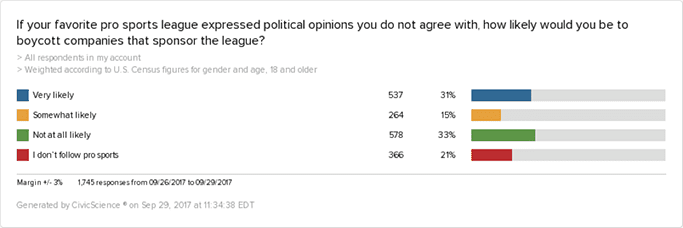Have I told you how much I love sports? I’m a fanatic. I played just about every sport you can think of as a kid. I collect memorabilia and even display it. I’m in three Fantasy Football leagues and have never watched an episode of Game of Thrones because it conflicts with Sunday Night Football (No, I don’t have time to record and watch later, on account of the three Fantasy Football leagues I have to keep up with).
Sports are my escape from most of my (and the world’s) problems. So, I’m super-excited anytime I can research and write about sports.
Except, this week. This week, sports sucked big-time. This week, sports ARE the problem.
Here are a few things we’re seeing:
The latest round of player protests may not scare more NFL fans away, but it’s making it much harder for the league to win people back. One of our senior analysts, Casey, had written a piece about NFL fan attrition last Friday and I came THIS close to telling you about it in last week’s email. Then, POTUS called the players a bunch of SOBs and we knew the fireworks were coming. Casey’s write-up on the before & after numbers is worth a quick read. TL/DR; Last Sunday’s drama didn’t necessarily offend a larger wave of NFL fans – it just made all of the people who were already leaving the sport much more resolved to never return.
If that’s not bad enough for the NFL, these pissed-off fans could punish the league’s sponsors if they’re not careful. Take a look at the chart below. 31% of U.S. adults say they would be Very Likely to boycott companies who sponsor leagues that are on the wrong side of political issues. These boycotters are much more likely to be affluent men between the ages of 55-64. I’m guessing that’s a pretty valuable demo to the NFL.
Oh, and the NFL wasn’t the only sports organization in a spot-of-bother…
The current NCAA basketball scandal and the role shoe companies played in it could halt the growth Adidas has been enjoying. 30% of adult consumers say they are less likely to purchase Adidas products based on the allegations that they bribed college basketball coaches. The saving grace for Adidas is that younger consumers are much less likely to care – and they’re the ones who are more influenced by sports marketing to begin with.
And here’s the punch-line:
It’s all basically the same people. Just look at the blue box at the top of this chart. Some people are hyper-sensitive to the mix of sports, ethics, and politics and some people just don’t care. The problem is that today (as I’ve told you a hundred times by now) politics are driving consumer behavior for 30-40% of Americans (roughly the same percentage who voted a certain way last year) in unprecedented ways. Maybe they’re all bluffing. But what if they’re not?
We did spend some time on things other than sports.
People are changing as healthcare consumers in lots of different ways. We published two different pieces of research on this topic this week. One found that Americans are less concerned about the state of healthcare than they were two years ago. There’s reason to believe this is correlated with proliferation of the Affordable Care Act (No, I’m not defending it; please don’t send me hate mail). As more people have health insurance, the less likely they are to worry about healthcare. You don’t need to be a data scientist to figure that out.
People who are most likely to switch health insurance providers go to the movies 36% more than average. That was just one of a list of 10 healthcare-related tidbits we wrote about. I liked this movie-related one because I know there are a lot of insurance-company types who read this email. Strikes me as useful.
Some Random (Vacation) Stats:
• 55% of Americans prefer beach vacations over all others
• 19% prefer camping or hiking vacations
• Cruises and learning/experiential vacations are tied at 13%
• 55% of people have gone or would go on vacation by themselves
• 46% of people love camping; 30% hate it.
• 22% have never been camping
What has two thumbs and hates camping? This guy.
Hoping you’re well,
JD










